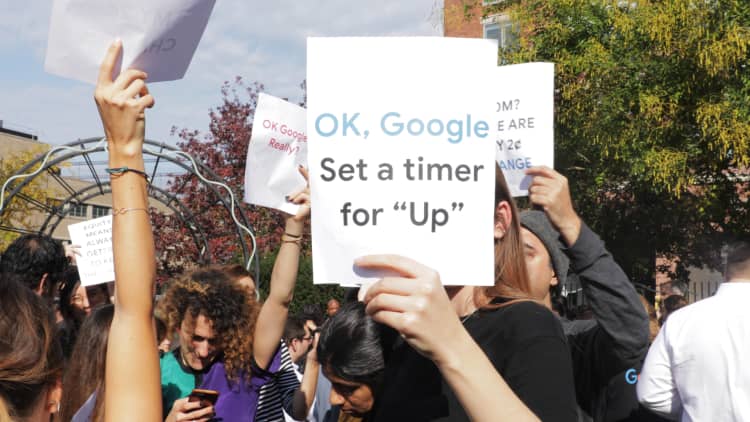If you think you've been harmed by an American corporation, you typically can't sue them in federal court. But on Tuesday, lawmakers moved one step closer to changing that.
The House of Representatives Judiciary Committee on Tuesday afternoon passed a bipartisan bill, the Forced Arbitration Injustice Repeal Act, that would end forced arbitration. Experts say they expect the legislation to pass in the full House as well.
A recent academic study found that 81 of the biggest 100 companies in America have put legal clauses in the fine print of their customer agreements that bar consumers from suing them in federal court and instead force victims to pursue a private dispute resolution method called arbitration, where they argue their case outside of the court system.
Arbitration doesn't just affect you when you're buying things or using a service. The Economic Policy Institute found that 60 million American workers are barred from suing their employer, including when they are fighting against serious claims such as discrimination, civil rights violations and sexual harassment.
"Forced arbitration doesn't give consumers or workers the full protection of the law," Rep. Pramila Jayapal, D-Wash., who serves on the House Judiciary Committee, said Tuesday. "It is a perpetually rigged deck against the most vulnerable party in the dispute," she said, adding that we are all at a "disadvantage in this system every single day."
The FAIR Act, if enacted, would eliminate companies' ability to use forced arbitration clauses in any employment, consumer and civil rights cases and allow Americans to fight their lawsuits in federal court. If consumers and employees did want to use arbitration, they still could, but it would be a voluntarily process, as opposed to their only option.
Why some lawmakers want to limit arbitration agreements
Mandatory arbitration agreements are everywhere. More than 60% of all online sales in the U.S. are done with companies that use consumer arbitration agreements, estimates Imre Szalai, a professor of social justice at Loyola University in New Orleans.
Last month, J.P. Morgan Chase rolled out new rules to almost all of its credit card customers, including those with the popular Sapphire, United MileagePlus and Slate cards. If a dispute arises, customers who did not opt out of the new mandatory arbitration policy will now have limited legal options.
Arbitration agreements like Chase's require consumers and employees to go before an arbitrator or a panel of arbitrators, who may even be hired by the company, to decide the final outcome of your dispute. Consumer advocates say in these cases, the arbitrators are less likely to remain objective. And there are typically few options to appeal if you don't like their ruling.
Companies typically contend they use arbitration because it saves everyone involved time and money. "When an arbitration process is designed appropriately, there are fewer barriers to bringing a claim in arbitration than bringing a claim in court, and it can be more convenient for claimants to obtain a hearing and to achieve a resolution of their claims," Chase spokeswoman Patricia Wexler tells CNBC Make It. "Arbitration may be conducted in person, by phone, email, or Skype, avoiding the need to take time off from work."
But whether consumers actually fare better is disputed. The American Arbitration Association, one of the largest administrators, reports that 53.3% of consumers who use its services get some type of relief in the cases they file. But the EPI found that consumers only won monetary relief in 9% of the arbitration cases it studied.
Why it matters that Americans can't sue
Over the past few decades, large corporations have used mandatory arbitration provisions effectively as a "get-out-of-jail free card for all kinds of misconduct and wrongdoing," says Robert Weissman, president of the progressive consumer rights advocacy group Public Citizen.
That's because lawsuits are about more than just getting reimbursed for past harms. They can shine a public light on bigger issues. Consumer advocates believe that Wells Fargo's employee practice of opening unauthorized bank accounts for millions of customers would have been exposed (and potentially ended) much earlier if the company had not enforced mandatory arbitration.
Some consumer agreements, including Chase's updated policy, do allow you to take your dispute to small claims courts, which typically handle cases that involve between $2,500 and $25,000 in damages, though the limits vary by state. But Szalari says small claims court is not an adequate replacement. Most small claims courts only offer consumers monetary awards in clear-cut cases and aren't able to weigh in on bigger issues of alleged fraud, negligence and actual harm.
Yet the new protections offered by the FAIR Act are far from a sure thing, despite the fact that Sen. Richard Blumenthal, D-Conn., introduced the companion bill in the Senate and Republican Rep. Matt Gaetz from Florida signed onto the bill as a co-sponsor in July.
Predictive intelligence firm Skopos Labs estimates the FAIR Act has only a 2% chance of being enacted.
But consumer advocates experts say that as more and more people are affected by forced arbitration, there's a greater chance that this type of legislation will move forward. "The hope is that this will become a movement and no matter what side of the aisle members of Congress fall on, that they will see that their constituents and voters are very much against forced arbitration," says Julia Duncan, senior director of government affairs at the American Association for Justice.
Don't miss: Consumers can't sue some of the biggest companies in the US—here's what that means for you
Like this story? Subscribe to CNBC Make It on YouTube!



